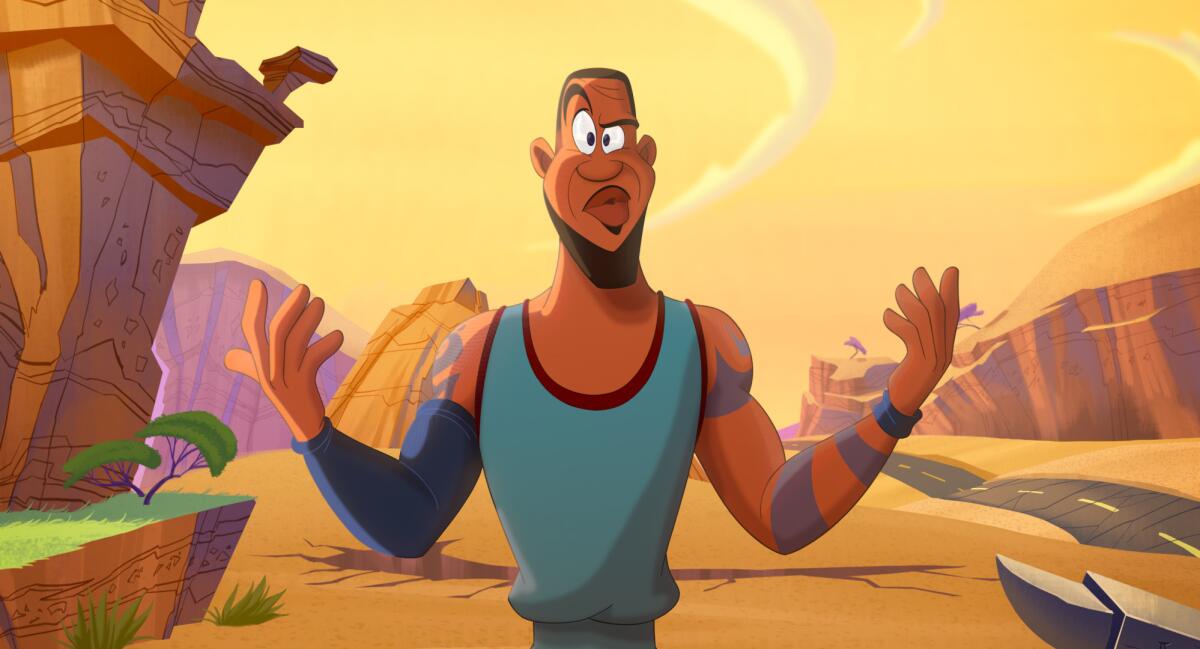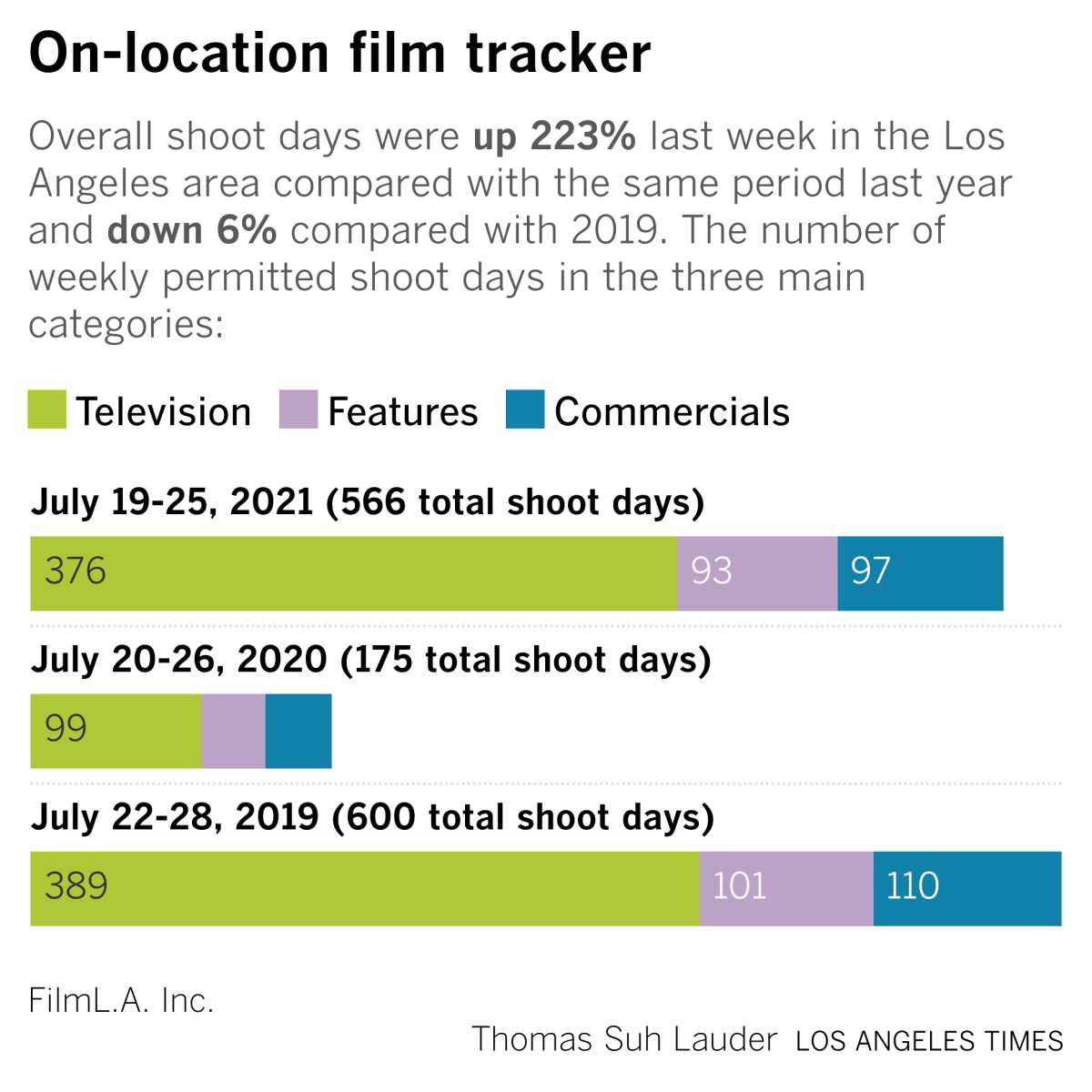Virus or streaming? Why movies like ‘Space Jam’ are falling fast at the box office

- Share via
This is the July 27, 2021, edition of The Wide Shot, a weekly newsletter about everything happening in the business of entertainment. Sign up here to get it in your inbox.
The drop in ticket sales between a big movie’s first and second weekends in theaters usually tells you a lot about the audience’s response.
Before the COVID-19 pandemic, a roughly 50% decline after the debut weekend was considered a strong result. Better retention would send Champagne glasses clinking. Sales plummeting more than 60% was generally considered a bad sign for the movie’s long-term prospects, or “playability.” People must not have liked the movie and told friends, family and social media followers to stay away and save their $10.
During the current vaccine-driven recovery, however, the majority of big movies that open with decent numbers are falling off a cliff the following week, and there is plenty of blame to go around.
“Space Jam: A New Legacy” opened July 16 with a better-than-expected $31 million domestically to debut at No. 1 but then fell 69% this past weekend, to land at No. 4. Before that, “Black Widow” suffered a 68% decline after earning its perch at the top in its first three days. “F9: The Fast Saga” dropped 67% in its second frame.
Welcome to the one-and-done phase of Hollywood’s box-office rebound.
Inside the business of entertainment
The Wide Shot brings you news, analysis and insights on everything from streaming wars to production — and what it all means for the future.
You may occasionally receive promotional content from the Los Angeles Times.
What’s going on? There are many factors, some of which are obvious, others that are not. The “Space Jam” sequel had poor reviews and is streaming simultaneously on HBO Max for a month at no additional charge, for example. “Black Widow” was available on Disney+ for a $30 upcharge while in theaters. With those movies, if people were waffling about whether to go to the multiplex, easy online availability gave them a good reason not to.
The National Assn. of Theatre Owners argued that the decay for “Black Widow” was evidence that same-day streaming and premium video on-demand (PVOD) releases were cannibalizing box office and encouraging piracy. As I wrote last week, there’s little doubt that same-day at-home viewing had an effect, but it’s difficult to know how much.
Further, if PVOD and streaming are the culprits, how does one explain the decline of “F9,” which is not yet available in living rooms? Sure, it’s coming to home video earlier than usual, but it’s not likely the average consumer knows that.
What’s still unclear is the lingering effect of the virus on moviegoing, especially with the Delta variant spreading rapidly among the unvaccinated. There’s some evidence that the uptick in cases and hospitalizations, which recently prompted a reinstated mask mandate in Los Angeles County, has made moviegoers more nervous about returning to cinemas.
I’ve heard, anecdotally, from a few insiders that fears of the virus could be eating into so-called walk-up sales. Casual moviegoers who might have been on the fence are now less inclined to go. Super fans (those who flock to movies opening weekend) are still coming out, though, making the grosses more frontloaded than usual.
According to research firm NRG, moviegoers’ comfort going to theaters dropped to 76% from 81% this past week, while the percentage who say they are “very comfortable” going to theaters dropped to 35% from 41%. Still, NRG executive Ethan Titelman said in an email that the bigger issue is the studios’ simultaneous release strategies, shorter theatrical windows and the effects of piracy.
Analysts are largely in agreement on this.
“The market is thin right now,” said David A. Gross, who runs Franchise Entertainment Research, a movie consultancy. “Movies are opening respectably well, but they are not holding up well. There’s COVID, there’s simultaneous streaming, there’s the nature of the movies themselves. There are a number of factors in play, and it’s different for each movie.”
I’m particularly curious about what’s going on with kids movies right now. Before the pandemic, animated films were about as reliable as a genre could get for Hollywood in terms of box office performance. In 2019, three of four top grossing films domestically — “The Lion King,” “Toy Story 4” and “Frozen II” — were children’s properties.
But animated movies lately have struggled at the box office, if they’ve played in theaters at all. “The Boss Baby: Family Business,” “Peter Rabbit 2: The Runaway” and “Spirit Untamed” all have done uninspiring business.
Maybe those titles wouldn’t have done very well in normal times either. However, I’ve heard from several parents who are nervous about taking their unvaccinated kids to a theater, even if the adults are willing to trek there.
Meanwhile, Disney has been releasing kids movies directly to Disney+ with strong results as it tries to shore up its subscriber base. Pixar’s “Luca,” released on the platform last month, has been tearing up the streaming ratings charts, clocking in with 3.2 billion minutes viewed during its first two weeks in release. That’s equivalent to more than 30 million full views for the 96-minute film.
This all comes as theater owners prepare to gather at Caesars Palace in Las Vegas in late August for CinemaCon, the annual convention that didn’t take place last year. Disney has already said it won’t be sending executives to the conference, citing the COVID-19 threat specifically in Clark County, Nev. It remains to be seen whether other studios will follow suit. Either way, the event is expected to be more subdued than in previous years.
The movie market faces its next test this weekend as Disney releases “Jungle Cruise” with Dwayne Johnson and Emily Blunt. Like “Black Widow,” it will be available for on-demand viewing on Disney+ for $30.
It’s still not clear how financially viable same-day PVOD releases are for big movies. It’s definitely a trade-off. But with the state of the pandemic and moviegoing, Disney is probably glad it doesn’t have to rely on box office alone.
Stuff we wrote
— The true story of the women who made “The Daily Show” — and were “erased” from its legacy. Lizz Winstead and Madeleine Smithberg created Comedy Central’s beloved news satire, which premiered 25 years ago. Meredith Blake asks, “Why haven’t they gotten credit for it?”
— Great read from Matt Pearce: AI deep-fakes of Anthony Bourdain’s voice are only a taste of what’s coming.
— The latest in our Explaining Hollywood series: How to get a job as an agent. Although the talent representation business has been challenged during the pandemic, a job as an agent is still one of the most coveted positions in Hollywood, Wendy Lee writes. Get advice from the experts.
— Prodding the HFPA: The Golden Globes group’s crisis PR consultant sent a memo to members last week, encouraging them to “consider what will happen if you do not pass the bylaws” meant to reform the organization.
Number of the week

That’s roughly the number of users that Comcast executives acknowledge engage with Peacock regularly, out of the 42 million accounts that have activated for the year-old streaming service. Comcast wants to expand that number, and it’s using its Olympics coverage to bring more eyeballs to the app. The push has lifted downloads, with Peacock ranked No. 4 on the free apps chart on Apple.
The question is how many people will stick around and use the service once they install it. That will depend on whether they’re impressed by the content they see there. The ad-supported Peacock has some original Olympics material, like a commentary show from Kevin Hart and Snoop Dogg, but the interface is also somewhat cluttered with notices for future replays of events.
Netflix loses share
Netflix added 1.5 million global subscribers in the second quarter but lost more than 400,000 in the U.S. and Canada. While part of the problem is that the surge in sign-ups due to COVID-19 stay-at-home orders last year has leveled off, analysts also blame an increase in competition from other streaming services.
Netflix executives pushed back on that notion in their letter to shareholders, citing Nielsen research saying that streaming represents just 27% of U.S. TV screen time, giving the company plenty of room to grow.
Analysts see signs of Netflix nearing market saturation domestically, however. And, as Wendy Lee writes, data from Parrot Analytics indicate that Netflix’s share of global audience demand for digital original series has dropped to below 50% for the first time ever. Losing market share isn’t surprising as new entrants gain traction, but it does mark a notable milestone in Netflix’s quest for dominance.
Speaking of competition, AT&T said its HBO and HBO Max unit gained 2.8 million domestic subscribers during the second quarter, showing steady growth in an increasingly crowded market. The HBO brands now have 67.5 million customers worldwide after launching HBO Max in Latin America.
More stuff you should read
— Here’s a head-spinning number for you: Universal Pictures and Peacock are spending more than $400 million for a new “Exorcist” trilogy.
The Peacock part of it is weird, though. As the New York Times’ Brooks Barnes writes, “the first film in the trilogy is expected to arrive in theaters in late 2023.” So what does Peacock get out of it, given that it has an output deal for Universal movies anyway? “Under the terms of the deal, the second and third films could debut on Peacock, according to one of the people briefed on the matter.” (NYT)
— This video investigation from the Wall Street Journal uses bots to show how TikTok’s algorithm gets inside your head. It sometimes gets dark.
— Also from WSJ: “Call Her Daddy” host Alex Cooper wants to have the biggest podcast in the world. Cooper has built a brand on the link between raunchy talk and female empowerment — to Spotify, it’s worth $20 million a year.
— THR’s cover story on “Jungle Cruise” has a lot of fun stuff. Dwayne Johnson and Emily Blunt’s reaction to certain Vin Diesel comments reminds me of the moments in “The Last Dance” when the producers hand Michael Jordan the iPad.
Hollywood production
Our Los Angeles on-location tracker is back with year-over-year comparisons to last year and 2019.

Final shot...
HBO Max’s “Woodstock ‘99: Peace, Love and Rage” is a good feel-bad documentary about one of music’s darkest moments of the late 1990s. And this was circa the Napster era.
For a palate cleanser, Mary Carillo’s epic rant on backyard badminton for the 2004 Athens Olympics remains one of the best things on the internet.
Inside the business of entertainment
The Wide Shot brings you news, analysis and insights on everything from streaming wars to production — and what it all means for the future.
You may occasionally receive promotional content from the Los Angeles Times.




